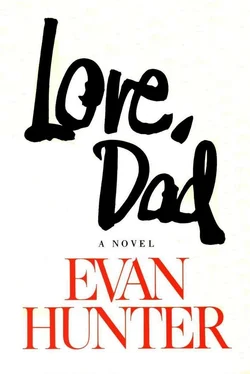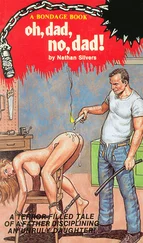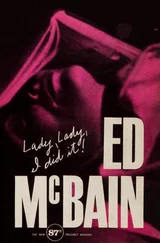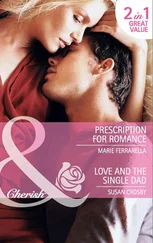Standing just behind them, watching, listening, Lissie thought the same thought that had passed through her father’s head at several different times today. She stood there behind this woman her father was marrying, waiting to hear the words this woman and father had concocted between them to sanctify what they were about to do, looked at this woman, and could think only that somebody was missing here, somebody who should have been here was not here. As the minister began to speak, she realized who was missing. Her mother. She had been expecting her mother to walk into this house from the moment she’d got here this afternoon. Her father was getting married. But some stranger was standing by his side.
“Dearly beloved,” the minister said, “we are gathered together here in the sight of God and these witnesses to join this man and this woman in holy matrimony, which is an honorable estate not to be entered into unadvisedly, but reverently and discreetly. Into this holy estate, these two persons now come to be joined. I charge you both,” he said, “to remember that love and loyalty alone will avail as the foundation of a happy and enduring home. No other human ties are more tender, no other vows more sacred than those you now assume.
“James,” he said, “wilt thou have this woman to be thy wedded wife, to live together in the holy estate of matrimony? Wilt thou love her, comfort her, honor and cherish her, in sickness and in health, prosperity and adversity, and forsaking all others, keep thee only unto her, so long as ye both shall live?”
“I will,” Jamie said.
“Joanna, wilt thou have this man to be thy wedded husband, to live together in the holy estate of matrimony? Wilt thou love him, comfort him, honor and cherish him, in sickness and in health, prosperity and adversity, and forsaking all others, keep thee only unto him, so long as ye both shall live?”
“I will,” Joanna said.
“The rings, please,” the minister said, and Lew Barker promptly handed him the two gold bands. “The wedding ring is the outward and visible sign of an inward and spiritual bond which unites two loyal hearts in endless love,” the minister said, and gave one of the rings to Jamie and the other to Joanna. As Jamie slipped the ring onto her finger, he said, “In token of the vow made between us, with this ring I thee wed.” Joanna slipped the second ring onto his finger and repeated the, same words.
“Forasmuch as James Croft and Joanna Berkowitz have consented together in holy wedlock,” the minister said, “and have witnessed the same before God and this company, by the authority committed unto me by the church and the laws of this state, I declare that James and Joanna are now man and wife.” He grinned broadly and said, “May God bless your union and grant to you the wisdom, strength and love to nurture and sustain it forever. Amen.”
“Amen,” the assembled guests murmured.
Lissie kissed her father on the cheek. “Congratulations,” she said. As Joanna offered her cheek to her, she extended her hand instead. Their eyes met. Joanna took the hand.
“Good luck,” Lissie said.
With so many musicians in attendance, it would have been surprising if no one played the piano. There were, by Joanna’s count, six genuine pianists at the wedding and at least a dozen other musicians whose second instrument was piano. Politely but pantingly, they waited their turn at the Kreuger piano bench, and the wedding guests were treated in succession first to Scriabin’s Sonata No. 1 in F Minor (in its entirety), next to the Allegro and Adagio sections of Mozart’s No. 17 in D Major, then to Lanner’s Valse Viennoises and finally to a melody composed on the spot in honor of the bride and groom, the pianist using a system of note-for-letter substitution wherever a letter actually signified a note — as it did with F, A, C, E and E, G, B, D, F.
As the piano-playing and musical hijinks continued in the living room, the caterers — cleaning up the debris of the wedding feast — tried to be as quiet as mice in the kitchen. After-dinner drinks were still being served, and now that the sun had finally come through, the French doors that led from the living room were open to the sloping vastness of the lawn outside. As sunset stained the western sky, some of the guests wandered out onto the grass, drinks in hand. Cameras clicked every thirty seconds. Professional models, even though they were not the stars here today, seemed to sense the exact instant before a shutter-release button was pressed: the smile magically appeared, the hair was tossed, the champagne glass lifted to just the proper height. Looking at the developed prints later, Joanna was astonished to see how many background people automatically leaped into the foreground with dazzling white smiles and sparkling eyes.
In the dining room and in the living room, in the kitchen and on the lawn, the conversation and the wine and the music flowed. And in what the architect had called the “milk room” and what Melanie still referred to as the playroom, the Rutledge kids gathered together as they did at most parties where there were grownups and kids, isolating themselves from the adults and filling each other in on what was happening where. What they talked about mostly that afternoon and evening was the five-part series the New York Times had begun publishing the Sunday before, under the modest headline VIETNAM ARCHIVE: PENTAGON STUDY TRACES 3 DECADES OF GROWING U.S. INVOLVEMENT.
The kids had not been surprised by the immediate response from the Nixon administration. As soon as the second installment was printed last Monday Attorney General John N. Mitchell fired off a telegram to the Times, citing the espionage law and ordering the newspaper to stop publication of this highly classified material. The Times had responded with a flat refusal, claiming the government was acting in violation of the First Amendment by invoking prior restraint where freedom of the press was concerned.
The kids all felt it was about fucking time the Establishment, as represented by no less stately a symbol than the New York Times, was getting a small taste of the same kind of shit they’d been getting for years. It seemed ironic to them that the issue revolved around the Vietnam war, which all of them had been yelling about forever, only to have their First Amendment rights violated — if not through open suppression, then certainly through ridicule, contempt or intimidation — each and every time they opened their mouths. But oh what a lot of yelling and hollering when the New York Times turned champion of the First Amendment now. As far as they were concerned, this was simply a matter of Establishment vs. Establishment, and whoever won the battle it was still all a lot of bullshit.
Somebody idly asked if anybody was holding.
One of the kids said he was, and they all went out on the lawn together.
Lissie went out on the lawn with the rest of them.
The plan was to spend the night at the Rutledge Inn, an authentic eighteenth-century coaching house, and then drive Lissie back to New York with them in the morning. They had left the reception at six o’clock, checking first with Esther Klein, who assured them Lissie was sleeping over with Rusty that night, and then slipping out the side door while someone in the living room was playing Schumann’s No. 2 in G Minor. At the inn, they made clumsy love in a huge old fourposter bed, called down for drinks and a snack at ten-thirty, watched the eleven o’clock news on television, and then turned out the lights. In the dark, they both agreed that if their marriage lasted as long as the reception that had followed it, which for all they knew was still going on, they’d be doing pretty well.
Читать дальше












